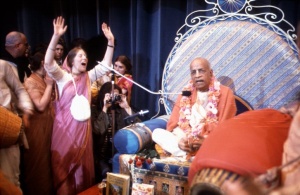SB 10.54.8: Difference between revisions
m (1 revision(s)) |
No edit summary |
||
| Line 1: | Line 1: | ||
{{info | {{info | ||
|speaker= | |speaker=Śukadeva Gosvāmī | ||
|listener=King | |listener=King Parīkṣit | ||
}} | }} | ||
[[Category:Srimad-Bhagavatam - Canto 10 Chapter 54|s08]] | |||
[[Category:Bhagavatam Verses Spoken by Sukadeva Gosvami - Vanisource|105408]] | |||
<div style="float:left">'''[[Srimad-Bhagavatam]] - [[SB 10|Tenth Canto]] - [[SB 10.54: The Marriage of Krsna and Rukmini|Chapter 54: The Marriage of Kṛṣṇa and Rukmiṇī]]'''</div> | |||
<div style="float:right">[[File:Go-previous.png|link=SB 10.54.7]] '''[[SB 10.54.7]] - [[SB 10.54.9]]''' [[File:Go-next.png|link=SB 10.54.9]]</div> | |||
{{RandomImage}} | |||
{{SBnotice}} | |||
==== TEXT 8 ==== | ==== TEXT 8 ==== | ||
<div | <div class="verse"> | ||
hastāḥ sāsi-gadeṣv-āsāḥ | :hastāḥ sāsi-gadeṣv-āsāḥ | ||
karabhā ūravo 'ṅghrayaḥ | :karabhā ūravo 'ṅghrayaḥ | ||
aśvāśvatara-nāgoṣṭra- | :aśvāśvatara-nāgoṣṭra- | ||
khara-martya-śirāṁsi ca | :khara-martya-śirāṁsi ca | ||
</div> | </div> | ||
| Line 17: | Line 22: | ||
==== SYNONYMS ==== | ==== SYNONYMS ==== | ||
<div | <div class="synonyms"> | ||
''hastāḥ''—hands; ''sa''—with; ''asi''—swords; ''gadā''—clubs; ''iṣu-āsāḥ''—bows; ''karabhāḥ''—fingerless hands; ''ūravaḥ''—thighs; ''aṅghrayaḥ''—legs; ''aśva''—of horses; ''aśvatara''—donkeys; ''nāga''—elephants; ''uṣṭra''—camels; ''khara''—wild asses; ''martya''—and humans; ''śirāṁsi''—heads; ''ca''—also. | |||
</div> | </div> | ||
{{SBcollapse}} | |||
==== TRANSLATION ==== | ==== TRANSLATION ==== | ||
<div | <div class="translation"> | ||
Lying all around were thighs, legs and fingerless hands, along with hands clutching swords, clubs and bows, and also the heads of horses, donkeys, elephants, camels, wild asses and humans. | Lying all around were thighs, legs and fingerless hands, along with hands clutching swords, clubs and bows, and also the heads of horses, donkeys, elephants, camels, wild asses and humans. | ||
</div> | </div> | ||
| Line 31: | Line 36: | ||
==== PURPORT ==== | ==== PURPORT ==== | ||
<div | <div class="purport"> | ||
Karabhāḥ indicates the portion of the hand from the wrist to the base of the fingers. The same word may also indicate an elephant's trunk, and thus in this verse the implication is that the thighs lying on the battlefield resembled the trunks of elephants. | ''Karabhāḥ'' indicates the portion of the hand from the wrist to the base of the fingers. The same word may also indicate an elephant's trunk, and thus in this verse the implication is that the thighs lying on the battlefield resembled the trunks of elephants. | ||
</div> | </div> | ||
__NOTOC__ | </div> | ||
</div> | |||
<div style="float:right">[[File:Go-previous.png|link=SB 10.54.7]] '''[[SB 10.54.7]] - [[SB 10.54.9]]''' [[File:Go-next.png|link=SB 10.54.9]]</div> | |||
__NOTOC__ | |||
__NOEDITSECTION__ | |||
Revision as of 11:08, 24 May 2021

A.C. Bhaktivedanta Swami Prabhupada
Please note: The synonyms, translation and purport of this verse were composed by disciples of Śrīla Prabhupāda
TEXT 8
- hastāḥ sāsi-gadeṣv-āsāḥ
- karabhā ūravo 'ṅghrayaḥ
- aśvāśvatara-nāgoṣṭra-
- khara-martya-śirāṁsi ca
SYNONYMS
hastāḥ—hands; sa—with; asi—swords; gadā—clubs; iṣu-āsāḥ—bows; karabhāḥ—fingerless hands; ūravaḥ—thighs; aṅghrayaḥ—legs; aśva—of horses; aśvatara—donkeys; nāga—elephants; uṣṭra—camels; khara—wild asses; martya—and humans; śirāṁsi—heads; ca—also.
Translation and purport composed by disciples of Śrīla Prabhupāda
TRANSLATION
Lying all around were thighs, legs and fingerless hands, along with hands clutching swords, clubs and bows, and also the heads of horses, donkeys, elephants, camels, wild asses and humans.
PURPORT
Karabhāḥ indicates the portion of the hand from the wrist to the base of the fingers. The same word may also indicate an elephant's trunk, and thus in this verse the implication is that the thighs lying on the battlefield resembled the trunks of elephants.